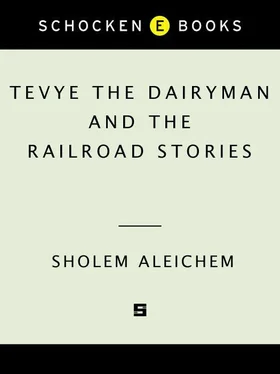
Tevye the Dairyman and The Railroad Stories
by
Sholem Aleichem
A little over a century ago, in 1883, an aspiring writer of comic talents named Sholem Rabinovich, who was then serving as a “crown rabbi,” a state-appointed clerical functionary in a small Jewish community in the Ukraine, published a satirical account of local politics in the St. Petersburg Yiddishe Folksblat and playfully signed it “Sholem Aleichem”—that is to say, “Hello There!” It was not his first alias. He already had, and would continue to assemble, a precocious collection of pseudonyms, including such curiosities as “Solomon Bikherfresser” (Solomon Bookeater), “Baron Pipernoter” (Baron Ogre), “Terakhs an Eynikl” (Terach’s Grandson), and “Der Yiddisher Gazlen” (The Robber Jew). Compared with these titles, however, which had at best a slapstick humor, the ancient Hebrew salutation first employed in the Folksblat (its Arabic cognate of salaam aleykum can be heard today throughout the Middle East) was a prescient choice. Meaning literally “peace be upon you,” the phrase is used in Yiddish not as an everyday greeting but as a more emphatic one that is reserved for either old acquaintances long unmet or new ones just introduced; thus, besides encoding in the form of a pun Rabinovich’s own name of “Sholem,” it pithily anticipated the career of an author who, over the next three decades, was to come and go in the Yiddish press from one newspaper and magazine to another, delighting an ever-growing audience with his unpredictable appearances before vanishing again until the next time. Gradually he used the new pen name more and more. It did not replace its rivals all at once, but by 1894, the year in which the first chapter of what is possibly the greatest of all Jewish novels, Tevye the Dairyman , appeared in the pages of the Warsaw yearbook Der Hoyzfraynt , it had become an exclusive trademark recognized by Yiddish readers everywhere. Eventually his own friends and intimates took to calling him by it too. Whereas Sholem Aleichem had once been Sholem Rabinovich, Sholem Rabinovich was now Sholem Aleichem, the private man subsumed in the public identity of the world’s most famous Yiddish writer.
Yet if comedy seems to imply a sufficient degree of well-being to make laughter possible, the debut of Sholem Aleichem as a comic Jewish writer did not come at an auspicious time. Indeed, coinciding as it did with the drastic deterioration in the Jewish situation in Russia that began in 1881 with the assassination of Alexander II and the bloody pogroms that followed, it could hardly have come at a worse one. Today, it is true, when modern Jewish history is read backwards in the monstrous light of the Holocaust, it is difficult to be as shocked as contemporaries were by the plight of Russian Jewry in the last decades of the Czarist Empire, during which the number of Jews murdered by Christian mob violence did not exceed several hundred. But in the context of its own time and place, the era of 1881–1917 in Russia was an exceedingly black period, the most savage experienced by Jews anywhere since the terrible massacres of Khmelnitsky’s Cossacks in the Ukraine in 1648–1649. Moreover, not only were the pogroms that took place under Alexander III and his successor, Nicholas II, actually incited and approved by the Russian government, they were part of an official policy of anti-Semitism calculated to render life so intolerable for the country’s Jewish inhabitants that, in the notorious words of Alexander Ill’s adviser Constantine Pobyedonostzev, a third of them would be forced to emigrate, a third to convert, and a third to perish from hunger. One has to go back to the Spanish Inquisition and Expulsion of 1492 to find a previous instance of a European government setting out on a deliberate course of first terrorizing and then eliminating its Jewish population.
Such were the times that Sholem Aleichem wrote about — and that, remarkably for a humorist, he wrote about without either ridiculing or rose-tinting, neither saying to his reader, “Laugh and be above it,” nor telling him, “Come, it’s not as bad as you think; let me show you the brighter side.” On the contrary: it was consistently his method, for all the near-manic exuberance of his prose, to confront the reader with reality in its full harshness, laughter being for him the explosive with which he systematically mined all escape routes away from the truth. Despite the exaggeration that is an ingredient of all humor, he had a reportorial passion for fact; more than one of his stories actually came from reading the morning newspaper. In the absence of other sources, one could infer much of the history and sociology of the Russian Jewry of his time from his work alone. And because, before one can fully appreciate this work’s universal dimensions (of which he himself was well aware) one must read it as the specific anatomy of Russian Jewish existence that it was, a few more words about the latter may be helpful.
Russia did not develop a Jewish problem; it swallowed one whole. Unlike other European countries, whose Jewish populations were built up in medieval times by a slow process of migration, often initially encouraged by rulers wishing to benefit from Jewish commercial skills and contacts, the Russian state, which had traditionally barred Jews entirely, suddenly acquired large numbers of them, and without any desire to do so, by virtue of the three partitions of Poland in 1772, 1793, and 1795, and the revisions of them made by the Congress of Vienna in 1815. Overnight, as it were, the Jewish communities of eastern and central Poland, Lithuania, Latvia, Byelorussia, and the Ukraine found themselves on annexed Russian soil — beyond whose boundaries, however, the Czarist regime in St. Petersburg had no intention of letting them spread. And so by the end of the eighteenth century, there had come into being the human enclosure of the Pale of Settlement, that vast ghetto of western and southwestern Russia to which millions of Jews were confined by a jumble of confusing laws. Although it ran roughly along the lines of the new territories, the Pale as an entity was never clearly defined; its exact borders kept shifting as different parts of it were declared in or out of bounds according to the whims of bureaucrats, the outward pressure of the Jews bottled up inside it, and the counterpressure of anti-Jewish officials and Russian merchants fearing Jewish competition. Thus, for instance, the Ukrainian capital of Kiev, the “Yehupetz” of Sholem Aleichem’s fiction and the city in which he lived for many years, was first opened to Jews (1794), then barred to them (1835), then put back on limits for temporary visits only (1862), then gradually reopened to Jewish residence by special permit, which depended on the petitioner’s profession and the connections he happened to have. Even more filled with reversals was the history of Jewish residential rights in the Pale’s rural villages, as opposed to its cities and towns. Originally left to the discretion of the local nobility in 1797, rural residence for Jews was denied in 1804, temporarily restored in 1807, redenied that same year, restored again in 1808, partially revoked once more in 1823, and so back and forth until 1910, when a final wave of rural expulsions began. Not all the restrictions on the books, of course, were always put into practice; yet even when they were not, the ever-present anxiety that they might be was enough to make a nightmare of the lives of great numbers of Jews who, generally for reasons of economic opportunity, were domiciled illegally.
Читать дальше













